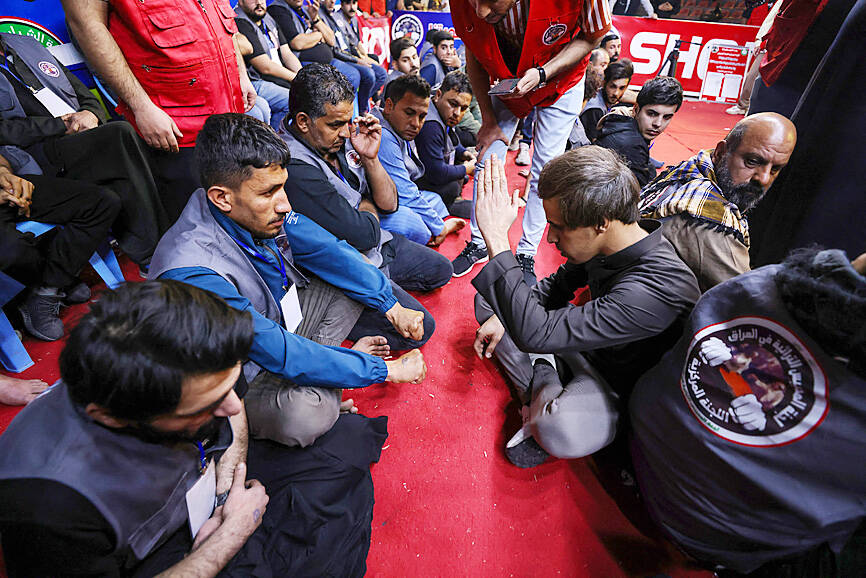In a Baghdad arena, a crowd cheers to the rhythm of drums, not for a soccer match but for a fiery centuries-old game enjoyed by Iraqis during Ramadan called mheibes.
“It’s a heritage game, the game of our ancestors, which unites all Iraqis,” said Jassem al-Aswad, a longtime mheibes champion in his early 70s and now president of the game’s national federation.
The game involves members of one team hiding a ring — mehbis in Arabic — and the captain of the opposing team trying to guess who has it in the palm of his hand.

Photo: AFP
He has to do so within 10 minutes.
Played during the holy Muslim fasting month of Ramadan, the game first appeared as early as the 16th century in Ottoman-era Baghdad, Iraqi folklore expert Adel al-Ardawi said.
More than 500 fans and players gathered in the stands and on the field for two matches: the Baghdad neighbourhood of Kadhimiya against the southern city of Nasiriyah, and the capital’s al-Mashtal district versus a team from the port city of Basra.
Everyone watched as the 40 players on one team huddled together under a blanket to avoid prying eyes, and decided who would hide the mehbis or signet ring worn by many Iraqi men.
Sitting on the ground or on chairs, the members of the team hiding the ring then adopted serious expressions. Some closed their eyes, while others crossed their arms or even clenched their fists.
The rival team captain carefully read these facial expressions and body language to try and guess who had the ring — before pronouncing the verdict.
When the first team failed to guess correctly, the other team scored a point and the crowd went wild.
“Iraqis love football the most, but mheibes comes a close second. It’s in our blood,” Kadhimiya captain Baqer al-Kazimi said.
The clean-shaven 51-year-old, who wears a black robe called a jellaba, said he inherited his love of the game from his father.
Though mheibes was impacted during decades of conflict, including at the peak of the sectarian war between 2006 and 2008 marked by suicide attacks and kidnappings, Kazimi said he and others continued playing even during those dark years.
He said that only the COVID-19 pandemic forced players to put their hobby on hold.
“Despite the sectarian violence, we played in cafes,” he said, recalling one game between players from the Sunni neighbourhood of Adhamiya and those from Kadhimiya, a predominantly Shiite area.
The two districts were separated by a bridge that had been closed for years because of the violence.
“We played on the bridge. Sunnis and Shiites met,” he said. Ahmed Maala from Basra recalled a game with a team from Baghdad that lasted all night.
“I learned the game by playing with friends and family,” he said. “Mheibes will go down in history for its very large fan base throughout Iraq.”
Passion for the game runs so deep that sometimes arguments erupt among players, even escalating into physical violence.
In a country with about 400 teams, annual competitions see players from across the nation competing against each other, with 10 teams qualifying in Baghdad alone to represent the city’s different neighborhoods.
Mheibes champion Aswad said he hopes the game would one day expand beyond Iraq’s borders.
“Just as Brazil popularized football, we will transmit this game to the whole world,” he said.

Luka Doncic on Monday produced a 46-point masterpiece as the Los Angeles Lakers snapped the Chicago Bulls’ four-game winning streak with a 129-118 victory on the road. Doncic rattled in eight three-pointers on 15-of-25 shooting from the field, finishing with seven rebounds and 11 assists to lead an impressive Lakers effort at the United Center. LeBron James chipped in with 24 points, five rebounds and three assists, while Rui Hachimura delivered an eye-catching cameo off the bench with 23 points from nine-of-11 shooting. The win was another encouraging result for the Lakers after a 116-110 defeat of the Dallas Mavericks on Saturday. “We did

The Milwaukee Bucks’ Giannis Antetokounmpo on Friday said that he will probably be out for an extended period after hurting his right calf again after a similar injury caused him to miss eight games earlier this season. Antetokounmpo had his right calf wrapped in the first half of their 102-100 loss to the Denver Nuggets. He did not appear comfortable the rest of the night and left for good with 34 seconds remaining. “At the end, I could not move no more, so I had to stop playing,” Antetokounmpo said. The two-time NBA Most Valuable Player said he expected to undergo an MRI

Juventus on Sunday dealt a huge blow to SSC Napoli’s Serie A title defense with a 3-0 win in Turin which left the reigning champions nine points behind league leaders Inter, who are pulling away from the chasing pack. Jonathan David, Kenan Yildiz and Filip Kostic netted in Turin as Juve, a revitalized team under Luciano Spalletti, moved into fourth with a statement win. Juve are fifth and one point behind both Napoli and AS Roma, who lifted themselves into third with a 1-1 draw with second-placed AC Milan in Rome. “We played really well and had fun ... today we were great,”

Nottingham Forest FC are to go into the Europa League play-off round after a 4-0 win over Ferencvaros TC on Thursday, while Celtic FC secured their place in the knockout phase with a victory over FC Utrecht. Aston Villa FC finished second in the league phase after recovering from two goals down to beat FC Red Bull Salzburg 3-2 with their spot in the last 16 already assured. Forest stood an outside chance of climbing into the top eight going into the final round of matches, but needed to beat Robbie Keane’s Ferencvaros and rely on other results going their way. Sean Dyche’s